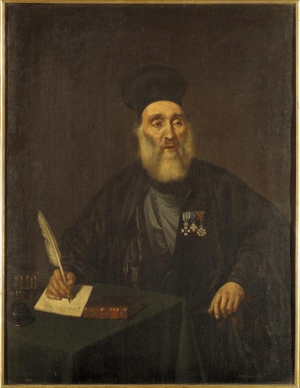Neophytos Vamvas facts for kids
Quick facts for kids
His Beatitude
Neophytos Vamvas
|
|
|---|---|
 |
|
| Dean of the School of Philosophy (University of Athens) | |
| In office 1837–1838 |
|
| Preceded by | Established |
| Succeeded by | Kyriakos Domnandos |
|
|
|
| In office 1841–1844 |
|
| Preceded by | Kyriakos Domnandos |
| Succeeded by | Philip Ioannou |
| Personal details | |
| Born | 1770 Chios |
| Died | 9 January 1856 (aged 85–86) Athens, Greece |
| Nationality | Greek |
| Profession | Priest, Professor, Dean |
| Known for | Modern Greek |
| Alma mater | École Polytechnique |
| Scientific career | |
| Fields | Chemistry Mathematics |
| Institutions | University of Athens |
| Notable students | Stamatios D. Krinos Konstantinos Negris |
Neophytos Vamvas (Greek: Νεόφυτος Βάμβας; 1770 – 9 January 1856) was an important Greek priest, thinker, and teacher. He was the very first dean (or head) of the philosophy school at the University of Athens. He is famous for his work in modern Greek education. People even called him the "teacher of the nation." He was also part of a big discussion called the "Neophytos Incident."
Contents
Early Life and Education
Neophytos Vamvas was born on the island of Chios in 1770. His birth name was Nikolaos. His parents were not wealthy, but Neophytos was very smart. He began his studies on Chios. He learned about physics, astronomy, and mathematics. He also became an expert in the Greek language.
At age 20, in 1791, he became a deacon, which is a type of priest. He continued his studies on the island of Sifnos in 1793. He also studied on the island of Patmos. He wanted to learn even more, so he aimed to study in Pisa, Italy.
Travels and Teaching
Around 1796, Vamvas traveled to Constantinople (modern-day Istanbul). He also visited Bucharest and other parts of the Ottoman Empire. He became a teacher for important families there. In 1804, he became the Headmaster of the Magali Scoli tou Genous, a famous Greek school.
Four years later, in 1808, Vamvas went to Paris, France. There, he met the famous Greek scholar Adamantios Korais. Korais helped Vamvas with his advanced studies. They became close friends. In Paris, Vamvas studied chemistry and translated a book about it into Greek. He also taught Greek to earn a living.
Role in Greek Independence
While in Paris, Neophytos Vamvas joined the Filiki Eteria. This was a secret society that worked to free Greece from Ottoman rule. In 1815, he returned to Chios and became the head of a high school.
In 1821, he went to Hydra to ask for help to free Chios. He then became the secretary for Demetrios Ypsilantis, a leader in the Greek War of Independence. Vamvas traveled with Ypsilantis and gave inspiring speeches to the fighters. After seeing the terrible destruction of his home island during the Chios massacre, he decided to focus on education.
Later Career and Contributions
In 1828, Vamvas settled on the island of Corfu. He taught at the Ionian Academy there. Around 1833, he moved to the island of Syros. He became the director of a school and taught many subjects. These included philosophy, mathematics, chemistry, and physics.
By 1836, he moved to Piraeus. In 1837, he was chosen to be a professor of philosophy at the newly founded University of Athens. This was because of his friendships with important leaders like Korais and Ypsilantis. He became the first dean of the Philosophy School. He remained a professor at the university until 1854.
The Neophytos Incident
Neophytos Vamvas is well-known for his work on translating the Bible into modern Greek. He published the New Testament in 1833 and the Old Testament in 1850. This effort caused a big disagreement known as the Neophytos Incident.
Some very traditional groups within the Greek Orthodox Church were against translating the Bible into the language spoken by everyday people. They believed it should only be read in older forms of Greek. The Church leaders in Constantinople officially condemned the translation. They said it was forbidden to publish Vamvas's version.
However, Vamvas's translation was eventually allowed in 1924. Today, it is widely used, especially by Greek Evangelical Churches. This incident showed the struggle between old and new ideas in Greek education and religion at the time.
Literary Works
Neophytos Vamvas wrote several books, mainly focusing on the Greek language.
| Date | Title | Title in English |
|---|---|---|
| 1825 | Γραμματική της Αρχαίας Ελληνικής Γλώσσης : Συνταχθείσα εις την Κοινήν Γλώσσαν δια τους Μαθητάς της εν Χίω Δημοσίας Σχολής Υπό Νεοφύτου Βάμβα. | Grammar of the Αncient Greek language: Compiled in the Common Language for the Students of the Public School in Chios By Neophytos Vamvas. |
| 1846 | Τεχνολογικόν της Αρχαίας Ελληνικής Γλώσσης Συνταχθέν υπό Ν. Βάμβα | Technology of the Ancient Greek Language Written by N. Vamvas |
| 1846 | Γραμματική της Αρχαίας και της Σημερινής Ελληνικής Γλώσσης / Συνταχθείσα δια τους Αρχαρίους υπό Νεοφύτου Βάμβα | Grammar of the Ancient and Modern Greek Language / Compiled for Beginners by Neophytos Vambas |
| 1849 | Γραμματική της Αρχαίας Ελληνικής Γλώσσης Παράλληλος με την Σημερινήν Υπο Ν. Βάμβα | Grammar of the Ancient Greek Language Parallel to the Modern By N. Vamvas |
See also
 | William Lucy |
 | Charles Hayes |
 | Cleveland Robinson |

